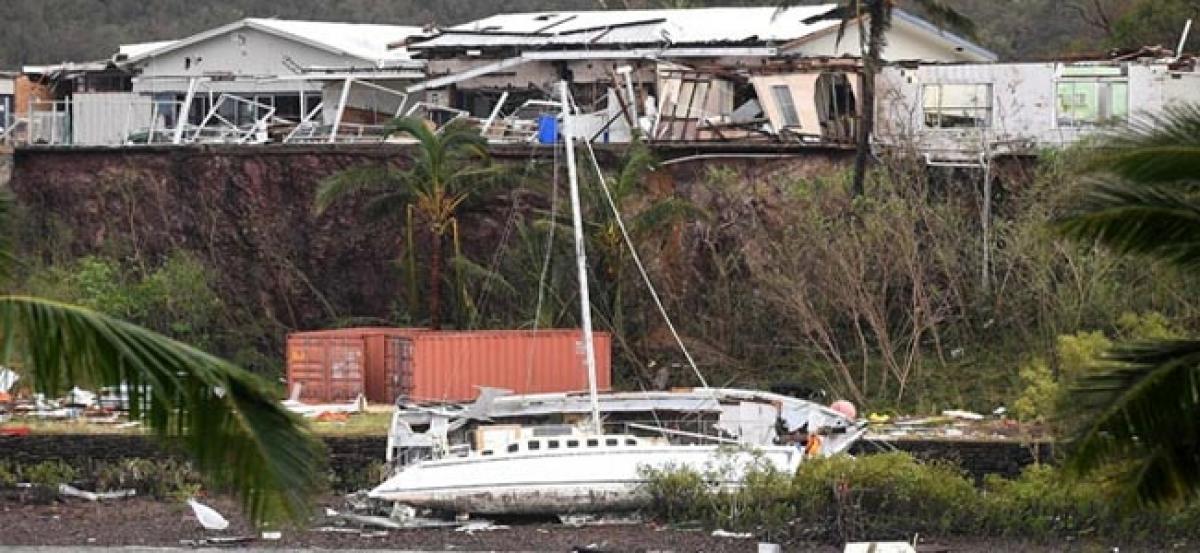Live
- Which one will you prefer caste census or skill census?
- Parents, teachers urged to let children grow freely
- Should State govt crack its whip on Endowment Department's functioning?
- Temple affairs a big task for EOs while few enjoy H.O. cushy stints
- RTA flounders on despatch of documents to motorists in city
- Police destroy ganja plantation
- UBI gesture to 3 welfare hostels
- Overwhelming response to Vijayawada Marathon
- Public Garden stepwell rots in apathy, walkers raise a stink
- Dinakar to send report to CM for justice to victims
Just In

Cyclone Debbie wrought widespread but moderate damage in Australia\'s northeast, authorities said on Wednesday, as flooding rain and fallen trees slowed troops and emergency workers reaching the worst-hit areas.
Sydney: Cyclone Debbie wrought widespread but moderate damage in Australia's northeast, authorities said on Wednesday, as flooding rain and fallen trees slowed troops and emergency workers reaching the worst-hit areas.
No deaths were reported a day after Debbie smashed tourist resorts, flattened canefields and shut down coal mines in tropical Queensland state as a category four storm, one rung below the most dangerous wind speed level.
"It's looking promising in terms of being able to rebuild promptly with most of the major infrastructure intact," Queensland state police deputy commissioner Steve Gollschewski told Australian Broadcasting Corporation television.
"We're still struggling to get in there, however," he said, adding planes and boats were being used to bring army personnel and emergency workers to places cut-off by road.
And as poor weather persisted and several Bowen Basin collieries stayed shut, analysts said Debbie could push coking coal prices higher - while tourism operators, even in unaffected regions, reported cancelled bookings.
Resorts along the world-famous Great Barrier Reef and coastal areas bore the brunt of the storm with wind gusts stronger than 260 kph (160 mph).
One family near Airlie Beach, over which the eye of the storm passed, had a particularly dramatic night. Queensland Premier Annastacia Palaszczuk said the family welcomed a baby girl who was born inside the Whitsunday Ambulance Station as the storm raged outside.
Pictures from Hamilton Island and Airlie Beach showed streets stacked with snapped trees, roof tiles and furniture, with wrecked yachts washed ashore.
"Nature has flung her worst at the people of Queensland," Australian Prime Minister Malcolm Turnbull told reporters at the Crisis Coordination Centre in Canberra.
Electricity was cut for more than 63,000 people, and Wilmar said its sugar mills were stilled at Proserpine and Sarina.
Hundreds of hectares of sugarcane crops had been flattened, Dan Galligan, chief executive of industry body Canegrowers, said in a statement.
In the Bowen Basin, the world's single-largest source of coal used to make steel, BHP Billiton, Glencore, and Stanmore Coal all said work at mines there was halted until further notice.
But Glencore added its Collinsville and Newlands mines were not damaged and it anticipated production would resume within 48 hours, with no impact on annual targets. Prices lifted, but other factors also contributed.
Ports operator North Queensland Bulk Ports Corporation also said it had no reports of significant damage.
Whitsunday Islands resorts were battered, running short on fresh water and closed to bookings until at least next week, but mostly intact.
Hoteliers hundreds of kilometres away at Cairns and Rockhampton were seeing cancellations for upcoming Easter holidays and operators worried that bad press would prolong the recovery, Queensland Tourism Industry Council chief executive Daniel Gschwind said.
"These are places that are entirely unaffected by these circumstances and that's the kind of collateral damage we suffer sometimes in our industry," he said.
Townsville Airport reopened, although airlines Qantas and Virgin said flights to Hamilton Island, Proserpine and Mackay were cancelled.
Only two injuries were reported, police said.

© 2024 Hyderabad Media House Limited/The Hans India. All rights reserved. Powered by hocalwire.com







